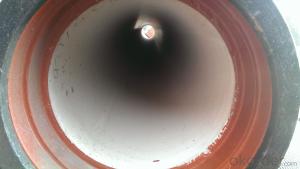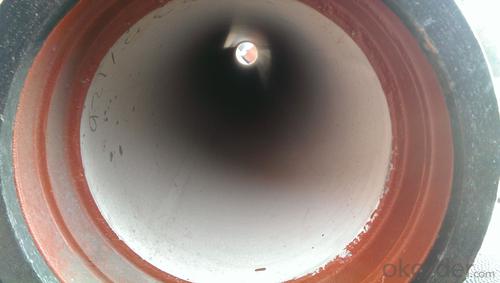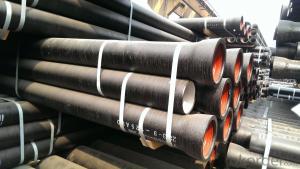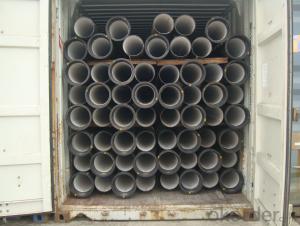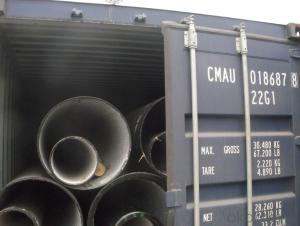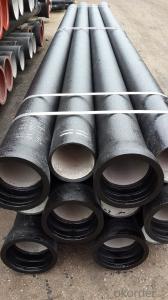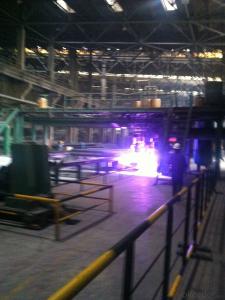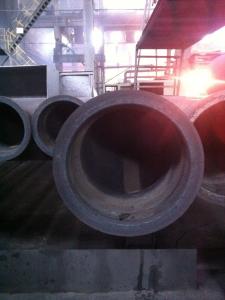DUCTILE IRON PIPES AND PIPE FITTINGS c25 DN900
- Loading Port:
- Tianjin
- Payment Terms:
- TT OR LC
- Min Order Qty:
- 25 m.t
- Supply Capability:
- 30000 m.t/month
OKorder Service Pledge
OKorder Financial Service
You Might Also Like
Material : Ductile Cast Iron
Size Range : DN 80mm to DN 2000mm
Unit Effective Length : 6m or 5.7m
Manufacture Standard: ISO 2531:1998/ EN 545:2006/EN 598:2007
Annual capacity : 200,000 tons
Coating Exterior: Zinc 130g/m2 according to ISO 8179-1 and bitumen coating 70 microns.
Cement Interior: Portland Cement/ High Alumina Cement/ Sulphate Resisting Cement Lining according to ISO 4179
Special requirements on external coating and internal lining can be applied
We also provide accessories such as SBR/EPDM rubber gaskets, lubricant paste, pipe caps, PE sleeves, etc.
Additional Parts:
Each pipe is strictly inspected according to related standard to ensure permanently high performance.
Easy Installation at site and service free for life
Long Service Lifespan
Quotation will arrive you within 24hours once we get your inquiry.
We guarantee offering you a competitive price.
A copy of original inspection reports of pipes will be offered after shipment.
Photos of loading process will be sent to the customer after shipment effect.
We will follow-up the delivery progress after shipment effect and update to the customer on weekly basis.
- Q: How do ductile iron pipes handle water hammer in high-rise buildings?
- Ductile iron pipes are well-suited to handle water hammer in high-rise buildings due to their inherent strength and durability. These pipes have the ability to withstand sudden changes in water flow and pressure, effectively reducing the impact of water hammer. Additionally, ductile iron pipes have excellent sound attenuation properties, which further minimizes the noise and vibrations caused by water hammer. Overall, ductile iron pipes offer reliable and long-lasting performance, making them an ideal choice for managing water hammer in high-rise buildings.
- Q: What are the advantages of using ductile iron pipe over concrete pipe?
- Using ductile iron pipe instead of concrete pipe offers several advantages. To begin with, ductile iron pipe has a higher strength-to-weight ratio, making it capable of withstanding higher pressure and loads while being lighter. This makes it easier to handle and install, ultimately reducing labor costs and saving time. Additionally, ductile iron pipe has superior corrosion resistance, making it less susceptible to rust or degradation over time. This extends its lifespan and reduces the need for frequent repairs or replacements, making it a more cost-effective option in the long run. Moreover, ductile iron pipe is more flexible and resilient compared to concrete pipe. It can withstand ground movement, settling, and other environmental factors without cracking or breaking. This reduces maintenance and repair costs, ensuring its durability. Furthermore, ductile iron pipe has a smoother interior surface, resulting in improved flow characteristics and reduced friction. This allows for more efficient transportation of fluids and minimizes the risk of clogs or blockages, guaranteeing uninterrupted flow. Lastly, ductile iron pipe is highly versatile and suitable for a wide range of applications. It can be used for both above-ground and underground installations, making it ideal for various infrastructure projects such as water supply systems, wastewater treatment plants, and industrial applications. In conclusion, the advantages of using ductile iron pipe over concrete pipe include its higher strength-to-weight ratio, superior corrosion resistance, better flexibility and resilience, smoother interior surface, and versatility. These benefits make it a reliable and cost-effective choice for various infrastructure projects.
- Q: How are ductile iron pipes protected against internal corrosion?
- Ductile iron pipes are protected against internal corrosion through a process called cement mortar lining. This involves applying a layer of cement mortar to the inner surface of the pipe, creating a protective barrier between the iron and the water flowing through it. This lining helps to prevent the formation of rust, corrosion, and scale build-up, ensuring the longevity and durability of the pipes.
- Q: Are ductile iron pipes resistant to chemical attacks?
- Yes, ductile iron pipes are generally resistant to chemical attacks. They have a protective lining that prevents the corrosive effects of various chemicals, making them suitable for transporting a wide range of liquids including water, sewage, and industrial waste.
- Q: Are ductile iron pipes suitable for hydroelectric power plants?
- Yes, ductile iron pipes are suitable for hydroelectric power plants. Ductile iron pipes are known for their strength, durability, and flexibility, making them an ideal choice for various applications in the water industry, including hydroelectric power plants. These pipes can withstand high pressure and are resistant to corrosion, making them suitable for transporting water at different stages of the hydroelectric power generation process. Additionally, ductile iron pipes have a long service life and require minimal maintenance, reducing the overall operating costs of the power plant. Hence, ductile iron pipes are a reliable and suitable option for hydroelectric power plants.
- Q: How does ductile iron pipe handle traffic loads and vibrations?
- Ductile iron pipe is well-equipped to handle traffic loads and vibrations due to its inherent strength and durability. The material properties of ductile iron, such as its high tensile strength and impact resistance, make it a reliable choice for withstanding heavy loads and vibrations caused by traffic. When subjected to traffic loads, ductile iron pipe has the ability to distribute the weight effectively, minimizing stress concentrations and potential damage. This is due to its flexible nature, which allows it to absorb and dissipate the forces exerted by traffic, preventing cracks or fractures from forming. Moreover, ductile iron pipe's ability to dampen vibrations is another advantage. Its high density and stiffness help to absorb and dissipate the energy generated by vibrations, reducing their impact on the pipe and surrounding infrastructure. This is crucial in areas with heavy traffic or construction activities, where vibrations can be common. Furthermore, ductile iron pipes are often designed and manufactured to meet industry standards and specifications, ensuring they can withstand the anticipated traffic loads and vibrations. These pipes are commonly used in water distribution systems, sewers, and underground infrastructure, where they are subjected to various dynamic loads and vibrations. In summary, ductile iron pipe is an excellent choice for handling traffic loads and vibrations due to its strength, flexibility, and ability to dampen vibrations. Its reliable performance under these conditions makes it a preferred material for infrastructure projects, ensuring long-term durability and minimal impact on the pipe's structural integrity.
- Q: Can ductile iron pipes be used in gravity sewer systems?
- Yes, ductile iron pipes can be used in gravity sewer systems. Ductile iron pipes are known for their strength, durability, and resistance to corrosion, making them suitable for carrying wastewater under gravity flow conditions.
- Q: Can ductile iron pipe be used for oil and gas transmission pipelines?
- Yes, ductile iron pipe can be used for oil and gas transmission pipelines. It offers excellent strength, durability, and corrosion resistance, making it suitable for the transportation of various fluids, including oil and gas. However, other factors such as specific project requirements, operating conditions, and regulatory standards should also be considered before making a final decision.
- Q: Can ductile iron pipes be used for both water and sewer applications?
- Ductile iron pipes are versatile and can be utilized for water and sewer purposes. These pipes exhibit remarkable durability and exceptional corrosion resistance, rendering them appropriate for transporting both drinkable water and wastewater. Furthermore, they possess the ability to endure high pressure and resist external loads, making them a perfect fit for underground installations. Additionally, these pipes boast a lengthy lifespan and necessitate minimal upkeep, thereby offering a cost-effective option for water and sewer systems.
- Q: Is the crankshaft material forged or ductile iron?
- Cast iron can not be forged, only steel, malleable iron can not be forged, only the crankshaft is particularly hot, can not meet the strength of the hardening when forging
Send your message to us
DUCTILE IRON PIPES AND PIPE FITTINGS c25 DN900
- Loading Port:
- Tianjin
- Payment Terms:
- TT OR LC
- Min Order Qty:
- 25 m.t
- Supply Capability:
- 30000 m.t/month
OKorder Service Pledge
OKorder Financial Service
Similar products
Hot products
Hot Searches
Related keywords
